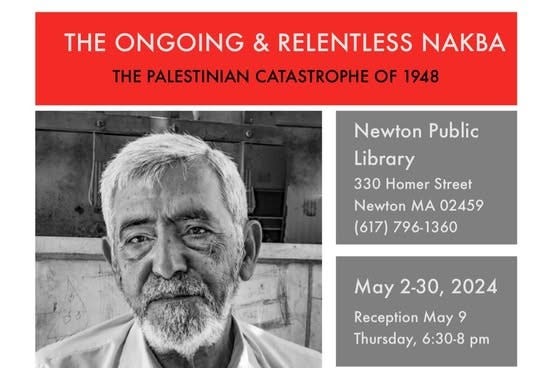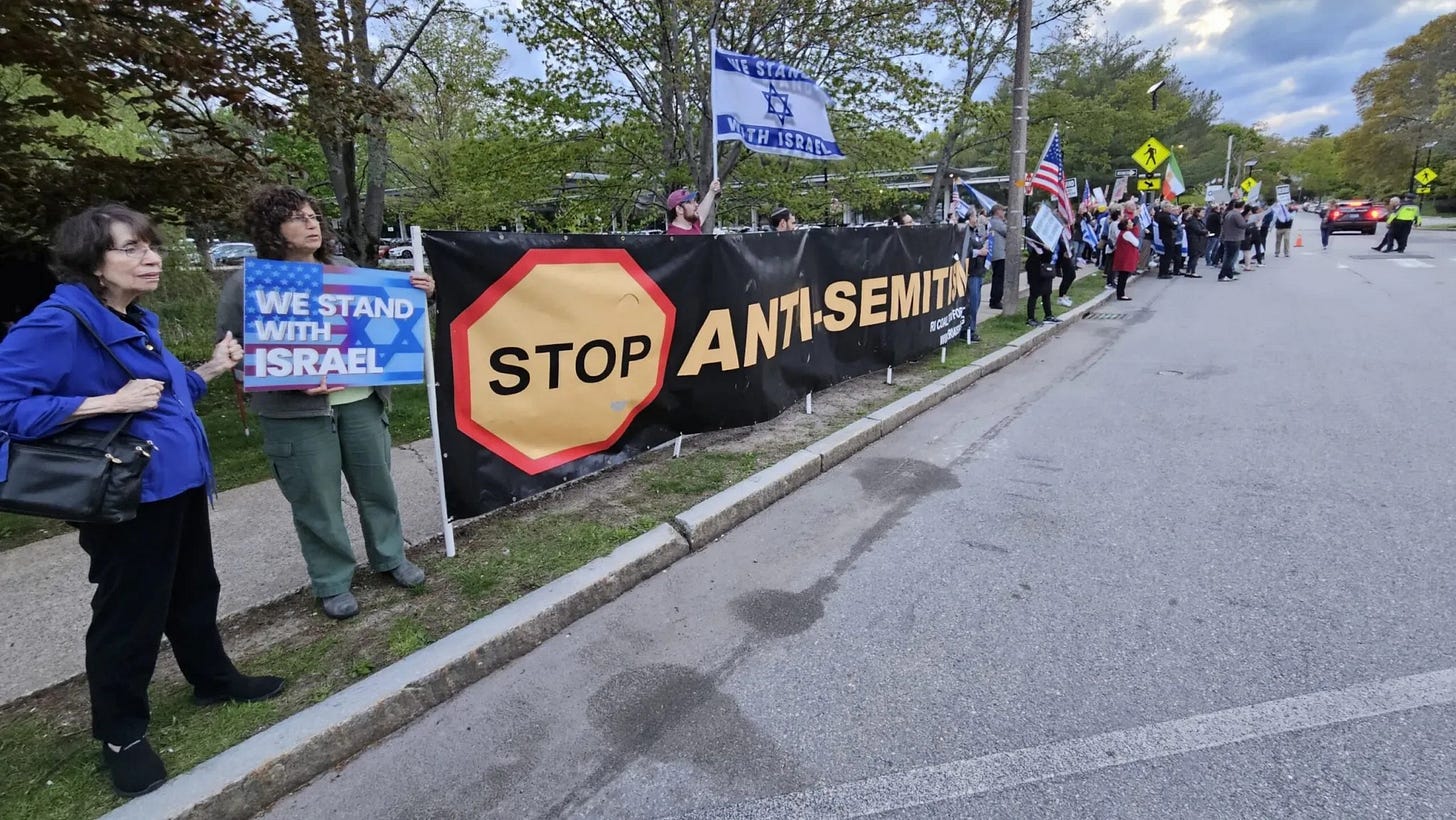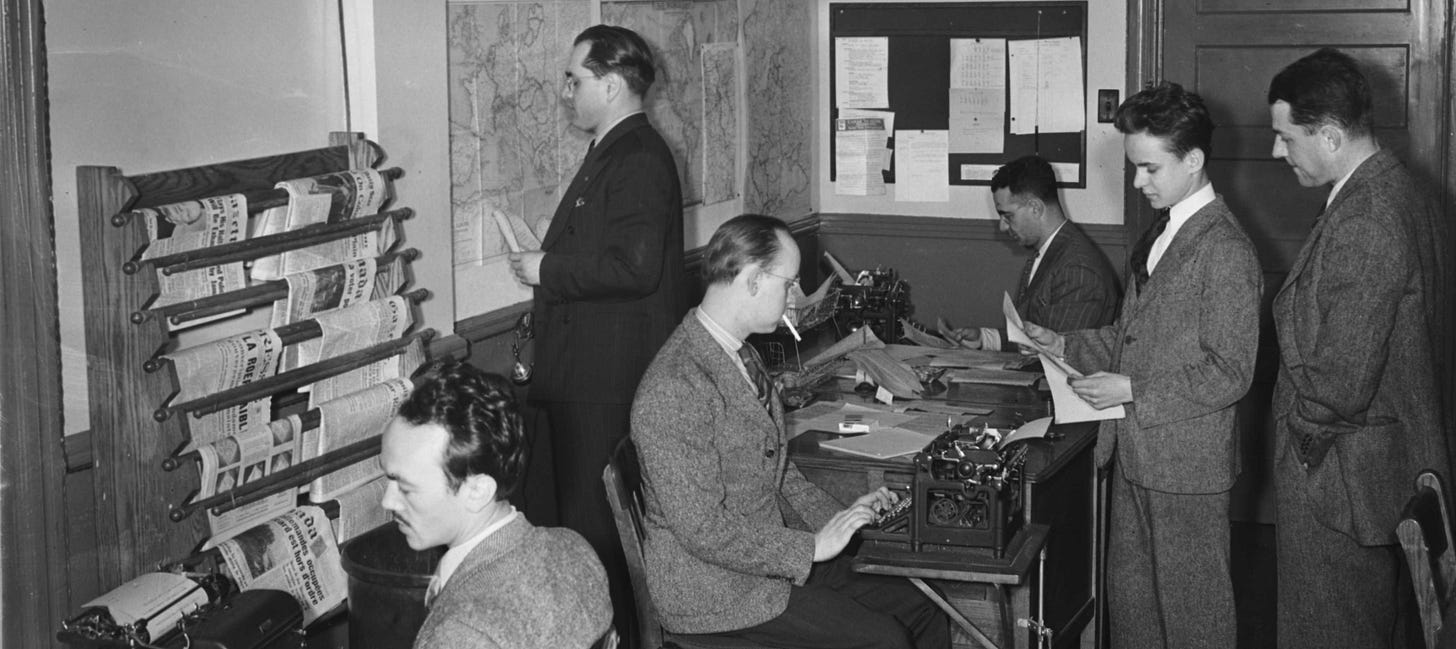Focus on the Nakba (full version)
April Updates from Sawa: Newton-Area Alliance for Peace and Justice
Index
Tracking anti-Palestinian, anti-Muslim, anti-Arab and related experiences in Newton
Sawa Events - Book Group this Sunday! “A Day in the Life of Abed Salama”
Outside Press/Sawa Members In The Press (Antisemitism Commission, and Harvard & Palestine Scholasticide.
The Nakba and Beyond: An Outsider’s Journey Through History
By David K.
In 1948 the British exited the Palestinian Mandate territory they had occupied since the conquest of the Ottoman Empire during World War I. The Jewish community in Palestine (the Yishuv), consisting predominantly of immigrants or refugees from Jewish communities in Europe, declared a new state of Israel, and fought a war against both the indigenous population, and the surrounding, newly independent Arab nations. By the end of the year, the majority of the native population (some 800,000 people) had been driven out of the country, and more had been internally displaced. The refugees were never allowed to return.
This expulsion from their homelands and refusal of their right to return is what the Palestinian people call “the Nakba” (an Arabic word for “catastrophe”).
When, some years ago, I first felt I needed to learn more about this history, the first book I turned to was 1948: A History of the First Arab-Israeli War by Israeli historian Benny Morris. Morris’s book seemed very comprehensive, reasonably balanced, and fair; he was critical of many of the actions of the Jewish forces and leaders during the war, admitted that (at least most) of the Palestinians who left were driven out by force, or the threat of force. He also admitted (and deplored) that atrocities such as massacres of Palestinian communities had been committed.
But the book left me with questions, mostly about “Why”? Why was the conflict necessary? Why couldn’t the two peoples just live together in peace?
I found works by other historians that suggested one reason: many in the Yishuv, and especially among the leadership (the “Jewish Agency” that preceded the government of Israel) did not WANT to share the land in peace. “Shtetl Colonialism: First and Last Impressions of Indigeneity by Colonised Colonisers”, a paper by Israeli-born historian Ilan Pappe, cites diary entries and letters by Jewish immigrants of the 2nd Aliyah (2nd wave of Zionist-inspired immigration, 1904-1914) to show that the newcomers were shocked to find the “empty land” they’d been promised actually teemed with people – people whose language and ways seemed alien to them. People who seemed to have stolen the homeland they craved for. The book Expulsion Of The Palestinians: The Concept Of Transfer In Zionist Political Thought 1882-1948, by Palestinian historian Nur Masalha, uses diary entries, letters, published articles, and minutes of the meetings of Zionist organizations to show that the great leaders of the Zionist movement, from the beginning, believed that establishing the Jewish homeland they sought would be possible ONLY if the native “Arabs” could somehow be “convinced” to leave, and that leaders of the Yishuv strove to vigorously keep the two communities strictly separate, even hostile: campaigning, for instance, against “Arab labor”, and to keep members of the Yishuv from patronizing from Palestinian businesses.
This contrasts with Morris’s hints (in his book “1948”, stated explicitly in later writings) that Arabs and Muslims simply possess an abiding, existential hatred of Jews; something hard to reconcile with the generally peaceable relations between Muslim, Jewish, and Christian communities in the Ottoman Empire, and throughout most of the Arab world, for centuries. (On Morris’s reliability, “No More Tears”, by Joel Beinin is interesting.(
It is, in fact, often written that the Palestinians resented and resisted Jewish immigration, but it’s rarely asked , “Why?” Certainly, large influxes of new populations often cause xenophobic reactions. But perhaps the Palestinians also recognized that they were faced, not just with new neighbors, but with a nation-building enterprise, and one that held no place for them.
In any case, independence was declared, the war did take place, and the Nakba did happen. Palestinians were driven out of the cities by the zionist militias , which were “Judaized”, and from most of the villages, which were demolished, often mined, and planted over to prevent return. Many Palestinians were killed, as at the village of Deir Yassin, where over 100 Palestinians, who offered no resistance, were slaughtered by members of the Jewish militia Irgun. Other Palestinians fled their homes when they learned that the militias were coming. Rapes of Palestinian woman, and other atrocities were reported.
An excellent way to get some direct feel for this period is to watch the documentary film “1948: Creation & Catastrophe”, which uses a mix of archival footage, voice-over, and interviews, including interviews with both living Nakba victims and Israeli military veterans, to tell the story from a range of viewpoints. An article whose 10 pages allow it go more deeply into this history than I can is “The expulsion of the Palestinians re-examined” in Le Monde Diplomatique.
The Nakba did not end in 1948. In 1967, Israel conquered (or “occupied”) the remainder of Mandatory Palestine (and more besides, although some was later given back). This war also drove hundreds of thousands of Palestinians into exile, many for the second time.
Israel has always painted the 1967 war as a defensive war (albeit a preemptive one). Ilan Pappe, in his book, “The Biggest Prison on Earth: A History of Gaza and the Occupied Territories” extensively analyzes Israeli government records to debunk this, demonstrating that long before the war began, the Knesset (Israeli parliament) had held extensive meetings to plan the sort of administration they would impose on Gaza and the West Bank, once they were occupied.
An excellent book that covers much of the long history of this struggle is Rashid Khalidi’s “The Hundred Years’ War on Palestine”. Khalidi fuses conventional sources with family archives and personal memoir in a creative and extremely informative way. A good supplement is Seth Anziska’s “Preventing Palestine”, a history presenting the many fallacies of the “Arab-Israeli Peace Process”, as it was presented to us by the US government and press. To learn something of the challenges – I’m tempted to say the horrors - of life in Israel-embargoed Gaza, long before the events of October 3, 2023, I recommend Sara Roy’s “Unsilencing Gaza”.
It has been 77 years since the initial ethnic cleansing of Palestine. Palestinians still have no country of their own, let alone the right to return to their original family homes and properties. Palestinians living as Israeli citizens have a second-class status, at best. The West Bank and Gaza remain massive prisons for Palestinians living precarious lives (or worse) under a hostile occupying power. The West Bank is more and more whittled away by illegal (but institutionally supported) settlements. Gaza has been all but obliterated, housing, infrastructure and still-uncountable tens of thousands of lives destroyed by bombs and bullets. Clearly the catastrophe for Palestinians has not ended. Clearly, the Nakba is ongoing.
Al-Nakba, a Continuing Trauma for Palestinians
This coming May marks the 77th memorial of one of the most traumatic and tragic events in the Palestinian history: the 1948 Nakba or "The Catastrophe" . This word, “Nakba”, refers to the forced displacement and ethnic cleansing of over 750,000 Palestinians in 1948, the destruction of more than 500 villages, and the establishment of the state of Israel on Palestinian land.
This May also marks a year since our Sawa community, in Newton, was traumatised during an event commemorating Al-Nakba at Newton Public Library in May 2024.
The Al-Nakba commemoration event at Newton Public Library was planned as a reception to honor an artist who was exhibiting photos he took in his travels to Palestine. The photos depicted the faces of Palestinians, old and young, most of whom lived in the occupied West Bank; some landscape photos were also included. At the event, three Palestinian Newtonian speakers were slated to speak, to share some of their experiences as Palestinian Newtonians, and to reflect on their reactions to some of the photos. Great deal of preparations took place, including conversations with the Library staff, the Mayor, and the Chief of Police, in order to ensure the safety and well-being of all participants.
As the event opened, some well-organized disruptors barged in, and occupied the front rows seats, tearing away the “reserved signs” that were placed on those seats which were reserved for the speakers, the artist, his friends and the set up crew. Not one minute past after the moderator convened the event, the disruptors started booing in a very loud noise, screaming over the moderator's voice and trying to prevent them from speaking. They refused to allow any of the speakers to speak and tried to silence the artist, refusing to let him make any comments. One of them called us “terrorists” while we were sitting quietly on stage and hadn’t uttered a word, or even introduced ourselves. They never gave us a chance to share our message of peace. They were aggressive and hurtful and their behavior was repulsive. At this point we realised that they were in fact succeeding in shutting down the event sponsored by the Library. Several Newton police officers, including the chief, were present, but they refused to intervene. They watched silently and ignored our plea to do something to protect our rights to freedom of speech and our rights to be safe and protected in public space.
Many of our community were traumatized by the disruptors’ actions, enabled by the inaction of the Newton police. To this day, I know that many in our community feel uneasy about going to the library, some avoid going there, and some even stopped driving the street where the library is located.
The Palestinian people have faced adversity and trauma throughout our modern history. We have a rich culture and proud history. We strongly believe that we should be afforded the space to share that with those who want to listen, in accordance with our right to freedom of speech, without being silenced or erased by those who refuse to hear.
To me, every Nakba commemoration is an opportunity to honor the resilience of the Palestinian people and an invitation to others to join us in solidarity as we fight for freedom and equality for all who call the Holy and home. I am saddened that some in our Newton community chose to shut down the exhibit’s reception with shameful hate speech calling us “terrorists,” “rapists,” and shouting “cages for Gaza.” We were denied the opportunity to share our message of peace and our vision for living together in harmony, freedom, equality and security with those who came in good faith to learn about our experience. I know the disrupters don’t represent the majority, in Newton or in the USA, but I worry that the majority may remain silent and let the haters ruin Newton’s potential to be a community where we all belong and are respected.
In closing it might be fitting to recite Mahmoud Darwish’s poem,‘Think of Others,’. The message is that in spite of our pain and misfortune. The poem acts as a powerful plea to ‘be the candle in the dark’ .
As you prepare your breakfast, think of others (do not forget the pigeon’s food). As you conduct your wars, think of others (do not forget those who seek peace). As you pay your water bill, think of others (those who are nursed by clouds). As you return home, to your home, think of others (do not forget the people of the camps). As you sleep and count the stars, think of others (those who have nowhere to sleep). As you liberate yourself in metaphor, think of others (those who have lost the right to speak). As you think of others far away, think of yourself (say: “If only I were a candle in the dark”).
Tracking anti-Palestinian, anti-Muslim, anti-Arab and related experiences in Newton
This is a slightly edited version of an article that appeared in last month’s issue. The tracking and reporting campaign is ongoing.
At this time of increased censorship, fear and intimidation, Sawa is taking the initiative to confidentially and securely collect information about our diverse community’s experiences of racism, discrimination, and silencing related to being Palestinian, Muslim, Arab or their allies in Newton. Our community has experienced an increase in such incidents since October 2023, yet it appears that our experiences are not consistently identified, reported and/or categorized as hate or discrimination incidents. Tracking these incidents is an important step in being able to advocate for change in policies within our school system, our city, and our state.
The experiences that we want to track include incidents and/or situations of hate, bias, prejudice, stereotyping, discrimination, bullying, harassment, intimidation, microaggressions, silencing, censorship, threats, hostility, assault, slander, and retaliation. This encompasses interpersonal incidents, but also emails, events, curricula, situations where your identity, views or thoughts are under attack or are being disregarded, or other expressions of bias and discrimination that make us feel unwelcome, unsafe or silenced.
CAIR-MA’s recent report examining bullying and Islamophobia in Massachusetts public schools documents an increase in such incidents, as reported by the students who participated in the organization’s survey. It notes that in the 2023-2024 school year, nearly half of the students reported experiencing anti-Muslim bullying, 22% of them experiencing this on a regular basis. Our evaluation of the current atmosphere is that there is substantial self-censorship and under-reporting.
We invite community members to share with us their experiences of anti-Palestinian, anti-Arab, anti-Muslim and related discrimination, racism and silencing in Newton. The information that you share with us will remain confidential, and will be saved in a secure database.
If you would like to share your experience, you can either:
(1) Directly fill-out the bias reporting form on a secure platform: https://cryptpad.fr/form/#/2/form/view/mPHB7vq0PhryuaYjYjXT1wCKy24lfqKraoyPyzWMNuY/ (2) Contact us to schedule a conversation by which you can tell us about your experience/incident: please email sawabr@proton.me, text 617-795-4170.
Please find additional information/background here.
Please share this information with trusted contacts who you think may have information to add. If you are a member of an allied group outside of Newton that would like to set up a system like this in your own community, we’d be happy to discuss tips and pointers with you.
Upcoming Sawa Events
Sawa Book Discussion on May 4 register now!
Join members of Sawa: Newton Area Alliance for Peace and Justice on Sunday, May 4, for a discussion of Nathan Thrall’s A Day in the Life of Abed Salama: Anatomy of a Jerusalem Tragedy, winner of the 2024 Pulitzer Prize for Nonfiction.
More details HERE.
The discussion will take place at a private home in Newton. Registration is required, using this form.
Outside Press/Sawa Members In The Press
Commission on Combatting Antisemitism
April’s meeting of the Massachusetts “Commission on Combatting Antisemitism” was held in Newton on April 7. The meeting was covered in Fig City News. What Fig City does NOT tell you is how many of the “More than sixty people signed up to speak in person or online“ expressed concerns that the Commission’s report might serve to weaponize “antisemitism” against free speech, stifling legitimate criticism of both our government and Israel’s. Jewish Americans spoke about the need for honest reflection on the meaning and nature of Zionism, and the dangers of conflating anti-Zionism or criticism of Israel with antisemitism, and worries that this conflation would not only lead to criminalizing speech, but distract from the real and dangerous antisemitism of the white supremacist and neo-Nazi movements.
The other thing the Fig City article does not tell you is the way some Commission members visibly sneered, when they heard young Jews discuss their solidarity and sense of allyship with Palestinian colleagues.
See recent issues for more information on the Commission, and Sawa’s work in “Together for an Inclusive Massachusetts” (TIM).
Harvard University and Scholasticide in Palestine
Sawa member Dr. Karameh Hawash Kuemmerle wrote an opinion piece entitled “Harvard Is Turning Its Back on Scholasticide in Palestine”, published in the Harvard Crimson on April 11. In the article, she tells us about Israel’s destruction of educational institutions in Gaza, and attacks on Palestinian scholarship more generally, and accuses the university of complicity in those attacks.
Resources on the Nakba (links to outside sites)
Last year, around the time of the Newton library art exhibit, “The Ongoing & Relentless Nakba”, Sawa put together a list of historical and other resources for people interested in learning more. The list can be found HERE.
We have tried to maintain the links in the Resource document current; however, these are links to outside resources, and not under our control. Apologies if some of the links are dead, or redirected. (However, please let us know if you have a problem. Email us at SawaNewtonMA@gmail.com.)
“Sawa” Means Together…
Driven by a vision of collective liberation, our diverse peace alliance advocates for equality and justice for Palestinians, Arabs, Muslims, and inclusion for all.







